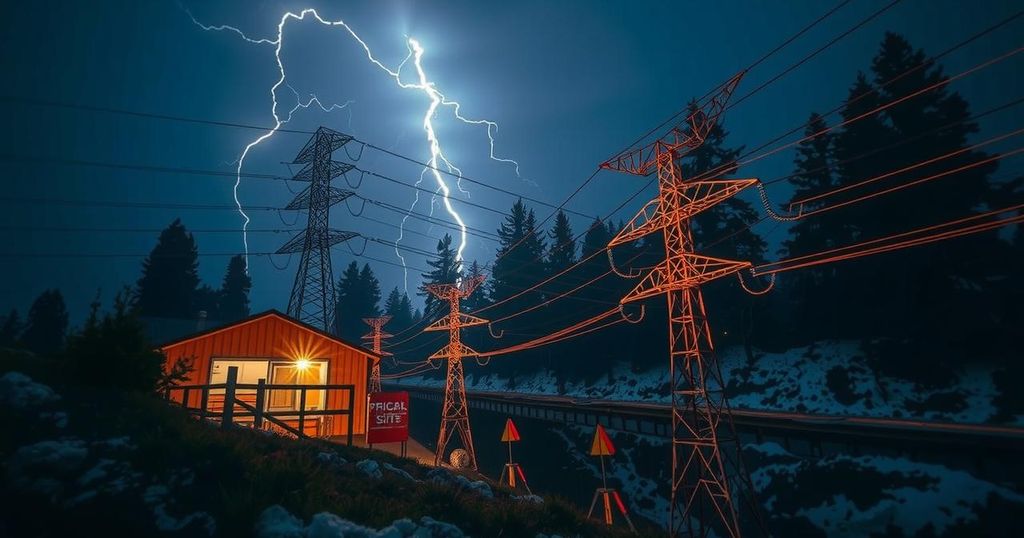A bomb cyclone recently disrupted power for half a million people in Western Washington, revealing critical weaknesses in the region’s electrical grid. Experts emphasize the need for extensive upgrades and a workforce boost to improve service reliability amid increasing electricity demand and climate-related challenges. The incident calls for immediate action to modernize the grid and enhance response strategies, particularly in communication between utilities and emergency services.
The bomb cyclone that recently struck Western Washington caused extensive outages, leaving approximately half a million residents without power. The cyclone’s strong winds uprooted trees and damaged numerous power lines, compromising the reliability of the Pacific Northwest’s electrical grid. Utility companies face urgent challenges, including delayed repairs and a significant shortage of skilled electricians, exacerbated by a rising demand for electricity. Experts emphasize the necessity for substantial upgrades to the grid to accommodate the increasing reliance on renewable energy and comply with the state’s carbon-free mandate by 2045.
The storm’s aftermath has triggered discussions on the need for enhanced resilience within the energy infrastructure. While the condition of Washington’s grid was already under scrutiny, the cyclone exposed its vulnerabilities. Moreover, the rise in extreme weather occurrences due to climate change poses an ongoing threat. Utilities now must prioritize improving communication with emergency services and investing in renewable sources to mitigate future outages effectively.
The lack of preparedness from some utilities, particularly Puget Sound Energy, raised concerns as it hindered timely assistance and information flow during the crisis. State officials reported coordination difficulties and noted that many critical facilities, including hospitals, also experienced power outages, heightening the urgency for improved response strategies. The Washington grid highlights an industry-wide need for a reliable workforce to maintain and repair essential infrastructure.
Although not attributable to climate change, the cyclone serves as a stark reminder of the urgent need to invest in modernizing the electrical grid. With a pressing demand for energy paired with increasing reliance on renewable resources, Washington state must enhance its infrastructure to ensure sustainability and reliability. Experts advocate for the development of localized battery storage systems and microgrid projects to ensure continuity of power during severe weather events.
As utilities strive to transition to renewable energy sources, a multifaceted approach is required to rethink and reshape the electrical landscape. Critics caution against reverting to fossil fuels as a solution to reliability concerns, arguing it would only exacerbate future climate-related challenges. As Elise Takahama of the Seattle Times reported, significant reform is necessary to improve grid resilience while furthering the transition towards a sustainable energy future.
The recent bomb cyclone in Western Washington has highlighted significant weaknesses in the Pacific Northwest’s electrical grid. Severe weather events are becoming increasingly frequent, driven by climate change, which amplifies the existing demand for electricity. As utilities are mandated to transition to carbon-free sources by 2045, experts are urging immediate upgrades and innovations in the grid to avoid devastating outages and ensure reliable energy supply. The electrical grid’s current state reveals not only infrastructural deficiencies but also workforce shortages that hinder effective response in emergencies.
In conclusion, the bomb cyclone has underscored the urgent need for substantial improvements in Western Washington’s electrical grid. As climate change continues to drive more extreme weather patterns, both utility companies and policy-makers must prioritize infrastructure enhancements, workforce development, and innovations in renewable energy sourcing. By addressing these challenges proactively, the state can build a more resilient energy future, capable of withstanding the demands of rapidly changing climate conditions and ensuring reliable service for all residents. Promoting localized solutions and improving utility responsiveness will play a pivotal role in minimizing the impact of future outages.
Original Source: www.seattletimes.com






